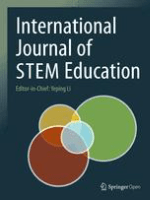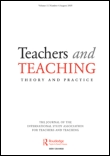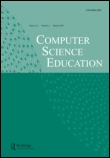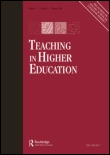
International Journal of STEM Education
Scope & Guideline
Transforming Educational Practices with Cutting-Edge Research
Introduction
Aims and Scopes
- Interdisciplinary Approaches to STEM Education:
The journal emphasizes interdisciplinary teaching and learning strategies that integrate various STEM fields, promoting a holistic understanding of STEM concepts among students. - Innovative Pedagogical Practices:
Research on innovative instructional strategies, such as active learning, project-based learning, and collaborative learning, is a core focus, aiming to improve student outcomes and engagement in STEM disciplines. - Equity and Inclusion in STEM:
The journal addresses issues related to equity, diversity, and inclusion within STEM education, exploring how various factors such as gender, race, and socioeconomic status influence participation and success in STEM fields. - Technology Integration in STEM Learning:
There is a strong emphasis on the integration of technology in STEM education, including the use of digital tools, simulations, and online platforms to enhance learning experiences. - Research on Student Identity and Motivation:
The journal explores how students' identities, motivations, and self-efficacy beliefs impact their engagement and persistence in STEM disciplines. - Teacher Professional Development and Support:
Research focused on the professional development of STEM educators is prevalent, examining how training and support can enhance teaching practices and student learning outcomes.
Trending and Emerging
- Mental Health and Well-Being in STEM:
There is an increasing focus on the mental health and well-being of students in STEM fields, exploring how stress, anxiety, and social dynamics affect learning outcomes. - AI and Emerging Technologies in Education:
Research investigating the impact of artificial intelligence and other emerging technologies on STEM education practices and student learning is gaining prominence. - Collaborative and Remote Learning Environments:
The shift towards remote and hybrid learning models has led to a rise in publications examining collaborative learning strategies and their effectiveness in online STEM education. - Social Justice and Advocacy in STEM:
Emerging themes include advocacy for social justice within STEM education, addressing systemic inequities and promoting inclusive practices for marginalized groups. - Data Science and Computational Thinking:
There is a growing emphasis on integrating data science and computational thinking into STEM curricula, reflecting the increasing relevance of these skills in the modern workforce.
Declining or Waning
- Traditional Teaching Methods:
There has been a noticeable decline in research focused on traditional lecturing methods, as the emphasis shifts towards more interactive and student-centered pedagogies. - General STEM Career Awareness:
Research specifically centered on general awareness of STEM careers without addressing the nuances of underrepresented groups or specific fields is becoming less prominent. - Basic STEM Content Knowledge:
Studies focusing solely on basic STEM content knowledge without integrating pedagogical strategies or real-world applications are appearing less frequently as the field moves towards more applied research. - Single-Domain Studies:
There is a decline in studies that focus on a single STEM discipline in isolation, as the trend moves towards interdisciplinary research that encompasses multiple STEM areas. - Static Assessments of Student Learning:
Research that utilizes static assessments of student learning outcomes, without considering dynamic methods or longitudinal studies, is becoming less common.
Similar Journals

Journal of Science Education and Technology
Shaping Tomorrow’s STEM Leaders Today.The Journal of Science Education and Technology, published by SPRINGER, stands as a premier platform in the fields of education and engineering, recognized with a prestigious Q1 ranking in both categories as of 2023. With an ISSN of 1059-0145 and an E-ISSN of 1573-1839, this journal serves as a pivotal resource for researchers, educators, and practitioners alike, emphasizing the integration of scientific inquiry and technological advancements in educational contexts. Since its inception in 1992, the journal has consistently provided high-quality, peer-reviewed research that shapes contemporary practices and methodologies in science education. With its notable Scopus rankings, including a 95th percentile in Social Sciences Education, the journal is essential for anyone eager to enhance their understanding of effective teaching in STEM fields. While the journal is not open access, its contributions are invaluable to advancing knowledge and innovations that are crucial for the progressive education landscape, making it a must-read for scholars and students committed to excellence in science education.

Teachers and Teaching
Exploring the Dynamics of Teaching and LearningTeachers and Teaching is a premier scholarly journal published by Routledge Journals, Taylor & Francis Ltd, providing an essential platform for researchers, educators, and practitioners in the fields of Education and Arts and Humanities. With an editorial focus on the dynamics of teaching and learning, the journal aims to share innovative research and insightful discussions that enhance pedagogical practices and policy development. Notably, it has achieved a Q1 ranking in both the Arts and Humanities and Education categories, signifying its impact and relevance in educational research, as reflected in its Scopus rankings, with an 84th percentile for Arts and Humanities and a 76th percentile in Education. Although it does not offer open access, the journal provides extensive access options for libraries and institutions, making its rich content available to a wide audience. Spanning from 1995 to 2024, Teachers and Teaching continues to set the standard for high-quality scholarship in the evolving landscape of education, inviting contributions that explore challenges and innovations in teaching methodologies.

TEACHING OF PSYCHOLOGY
Exploring Cutting-edge Approaches in Psychology InstructionTEACHING OF PSYCHOLOGY is a distinguished academic journal published by SAGE Publications Ltd, focusing on the field of psychology education. Established in 1975, this journal has carved out a vital niche in the academic landscape, facilitating the dissemination of innovative teaching practices, research outcomes, and pedagogical strategies that enhance the learning experience in psychology. With an impressive H-index indicating its influence, TEACHING OF PSYCHOLOGY is ranked in the second quartile for Education and third quartile for Psychology (Miscellaneous) in 2023, reflecting its pivotal role in these fields. The journal boasts a robust Scopus ranking, placing it within the 55th percentile for Social Sciences - Education and the 42nd percentile for General Psychology, demonstrating its relevance and reach among scholars and practitioners alike. Although it does not offer open access, it remains a crucial resource for educators, researchers, and students seeking to enhance their understanding and application of psychological principles in educational settings. By contributing to the ongoing dialogue about effective teaching methodologies in psychology, the journal aims to inspire and inform educators, fostering an environment of rigorous academic inquiry and practical application.

Journal of Mathematics Teacher Education
Empowering Educators Through Innovative ResearchJournal of Mathematics Teacher Education, published by SPRINGER, serves as a pivotal platform for scholarly communication in the fields of Education and Mathematics. With a distinguished Q1 ranking in both disciplines and exceptional Scopus rankings—placing it in the top 94th percentile for Mathematics and the 84th percentile for Education—the journal is dedicated to advancing research and practice in mathematics education from a global perspective. Established in 2005 and converging towards 2024, it invites contributions that investigate innovative teaching strategies, curriculum development, and teacher education methodologies. Although the journal does not offer Open Access, its rich collection of empirical studies, reviews, and theoretical articles provides invaluable resources for educators, researchers, and students aiming to elevate the quality of mathematics instruction. Situated in Dordrecht, Netherlands, the Journal of Mathematics Teacher Education remains a significant asset to the academic community, fostering discussions that drive progress and enhance student learning experiences.

Frontiers in Education
Shaping Tomorrow's Scholars with Rigorous Research.Frontiers in Education is a distinguished open-access journal published by FRONTIERS MEDIA SA, dedicated to the advancement of educational research and practice. Launched in 2016, this journal has quickly established itself within the field, attaining a Q2 ranking in Education for 2023, positioning it among the top-tier publications in the field. With a Scopus rank of #580 out of 1543, it lies in the 62nd percentile, highlighting its significance and reach within the scholarly community. Based in Lausanne, Switzerland, Frontiers in Education aims to provide a collaborative platform for educators, researchers, and practitioners to disseminate high-quality research findings and innovative educational practices. As an open-access publication, it not only champions the principles of accessibility but also enhances the visibility and impact of its published work. This journal is instrumental in shaping the future of education through rigorous research, critical analysis, and the promotion of best practices, making it an essential resource for anyone invested in the field.

International Electronic Journal of Mathematics Education
Exploring New Horizons in Mathematics Teaching and LearningInternational Electronic Journal of Mathematics Education (IEJME) is a premier platform dedicated to advancing the field of mathematics education through rigorous research and innovation. Published by MODESTUM LTD, this interdisciplinary journal focuses on the pedagogical, theoretical, and empirical aspects of mathematics education, facilitating a deep understanding of teaching practices, learning methods, and curriculum development. With its commitment to open access, IEJME ensures that research findings are accessible to a global audience, fostering collaborative efforts among educators, researchers, and practitioners. The journal has maintained a commendable position in academic rankings, holding a Rank of #114/399 in General Mathematics and #782/1543 in Education within Scopus, highlighting its significant contribution to the scholarly community. By publishing high-quality research from 2009 to 2016 and 2021 to 2024, IEJME continues to serve as an essential resource for those invested in enhancing mathematical understanding in educational contexts, inspiring future generations of mathematicians and educators.

INSTRUCTIONAL SCIENCE
Pioneering the future of instructional practices.INSTRUCTIONAL SCIENCE is a premier academic journal published by Springer that focuses on advancing the field of education through research in instructional methodologies and practices. With an ISSN of 0020-4277 and an E-ISSN of 1573-1952, this journal is recognized for its rigorous scholarly contributions, evident in its impressive 2023 impact factor that places it in the top quartile (Q1) for both Developmental and Educational Psychology and Education. Situated in the Netherlands, the journal has a comprehensive publication history from 1972, making it a respected source for researchers seeking to explore innovative teaching strategies and learning processes. Its Scopus rankings further reflect its esteemed position, ranking #285 out of 1543 in Social Sciences – Education and #99 out of 360 in Psychology – Developmental and Educational Psychology, highlighting its relevance and impact within these fields. While currently not offering Open Access, INSTRUCTIONAL SCIENCE remains a vital resource for educators, psychologists, and students who are committed to fostering effective learning environments through evidence-based practices.

Computer Science Education
Advancing the Frontier of Computer Science LearningComputer Science Education is a prestigious journal published by ROUTLEDGE JOURNALS, TAYLOR & FRANCIS LTD, focusing on the critical intersection of computer science and educational practices. Established in 1988, this journal has become a cornerstone for researchers, educators, and practitioners interested in enhancing teaching methodologies and learning outcomes in computer science. With an impressive ranking within the top quartile (Q1) in both Computer Science (miscellaneous) and Education categories for 2023, as well as high Scopus percentile placements, it underscores its significance in advancing the discipline. The journal offers a platform for innovative research encompassing diverse educational environments and approaches, and while it currently does not offer open access options, it remains committed to disseminating high-quality scholarly work. As a vital resource for anyone looking to contribute to and understand the evolving landscape of computer science education, Computer Science Education continues to shape the future of learning in this dynamic field.

TEACHING IN HIGHER EDUCATION
Fostering inclusive discourse on educational methodologies.TEACHING IN HIGHER EDUCATION is a premier academic journal published by Routledge Journals, Taylor & Francis Ltd, dedicated to advancing the scholarship and practice of teaching within the higher education sector. With an ISSN of 1356-2517 and an E-ISSN of 1470-1294, this journal is widely recognized for its profound impact in the field, boasting a 2023 category rank of Q1 in Education, placing it in the top tier of educational research. Its commitment to fostering an inclusive and dynamic discourse on pedagogical methods and learning frameworks makes it essential reading for researchers, educators, and policymakers alike. Spanning topics such as student engagement, curriculum development, and innovative teaching strategies, TEACHING IN HIGHER EDUCATION aims to contribute to ongoing conversations and practical applications that enhance the educational landscape. While an Open Access option is not available, the journal maintains a robust readership, with its articles being rigorously peer-reviewed and disseminated to reflect cutting-edge research trends and practices in education.

Issues in Educational Research
Catalyzing change through high-quality educational research.Issues in Educational Research is a prestigious peer-reviewed journal dedicated to advancing the field of education through the dissemination of high-quality research, insights, and discussions surrounding contemporary issues in educational practice and policy. Established in 2002 and published by the Western Australian Institute of Educational Research Inc, this journal has been a vital resource for scholars and practitioners alike, fostering a dynamic dialogue in the field. With an impressive classification as Q2 in Education and Scopus ranking at the 61st percentile, it is recognized for its significant contributions to educational research. As an Open Access journal since 2008, Issues in Educational Research ensures that its content is freely accessible, enhancing the reach and impact of its publications. This journal serves not only as a platform for presenting scholarly articles but also as a crucial forum for educators, researchers, and policymakers seeking to address the challenges and innovations within education. For more information, you can reach the editorial team at their address located at C/O Brad Gobbie, School of Education, Rockingham Campus, Murdoch University, Rockingham WA 6168, Australia.